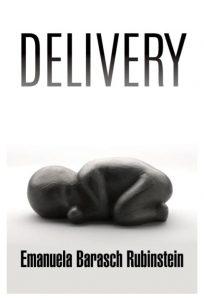“In Delivery, a past trauma surfaces—emotionally bruising, yet heralding a change.”
Emanuela Barasch-Rubinstein
Delivery, by Emanuela Barasch Rubinstein, will be published this coming week, and as the launch date of 8th July approaches, we're hosting a post from Emanuela's own blog on the origins of her novel:
‘Years ago, I ran into a classmate whom I hadn’t seen for years. I asked her how she was, and she replied, “You won’t believe it—I gave birth a week ago.” I complimented her for her slim figure. She smiled and said it was an easy labor, without complications, and that she was so happy with the newborn baby and glad to return to her daily routine. Despite her smiling face, as she spoke, tears began running down her cheeks. “Why are you crying?” I asked, and she responded, “I don’t know what happened to me when I gave birth. Something is broken; I don’t know what it is and how to fix it.”
After having given birth three times, having used my academic skills to examine the depiction of giving birth in fiction and films, and having taught fiction that includes scenes of labor, I came to understand that no single human experience is as repressed as giving birth. If we were to examine western fiction, films, philosophical and religious writings—even psychological research—we would have to conclude that this very primal act is largely ignored. Most people would compare it to other life-defining events: falling in love, marriage, separation from a spouse, illness, losing a loved one, or undergoing a trauma (accident, war, etc.). There are plenty of literary examples for all these events, but only very few examples of labor. I am not referring to couple of sentences about calling a midwife or going to the hospital. A full focus on the human experience of giving birth is almost missing in literature and films.
Why are the descriptions of labor so scarce? The first response I often encounter is that it’s “ugly”. Giving birth is both painful and not aesthetically pleasing. Of course, other types of “ugly” scenes—war-torn towns with gruesomely wounded soldiers, people—young and old—dying of illnesses, and misfortunes of all types are common in fiction, and even more so in films. Contemporary spectators seem to be inured to all sorts of cruelties spreading across the big screen. Why is it acceptable to portray a soldier bleeding to death, dying alone on the battlefield, but not a woman in the pain of labor?
Deeper explanations point to religion and patriarchal culture. Christianity, which has affected us all, ascribes a huge importance to Mary’s pregnancy, yet ignores her feelings during pregnancy and her experiences when giving birth. Such feminist thinkers as Simone de Beauvoir argued that men wish women to have children and, therefore, intentionally conceal the difficulties of giving birth and motherhood.
I have no definite answer as to why birthing is so heavily repressed, but I think it needs to change. I certainly felt the consequences of such repression. I think I can say that, implicitly, I’ve always feared giving birth. When pregnant for the first time, I shared my anxiety with my family and female friends. They all insisted that the pain and agony would be completely erased once the child was born. This did not happen. I love being a mother and it is a source of endless happiness, but I forgot nothing! After discussing this with women of all ages, I am positive that young women find the idea of giving birth scary and intimidating, and this has profound consequences on their self-perception which are not fully recognized by psychology. Many women feel that labor changes them, but instead of acknowledging it, they reduce it to “hormonal change”. The body-mind relation is, of course, a complex issue. But when we read about a man suffering on his deathbed, we don’t dismiss his thoughts and feelings only because his body is decaying. Humans are made of both mind and matter; I believe in a holistic approach which takes both into account.
Delivery gives voice to mothers but also to those affected by the birth: grandparents, and young friends. Strangely, grandparent characters are very common in children’s books, but not so much in contemporary adult fiction. It would be rather difficult to find a full discussion on the emotional implications of becoming a grandparent, the changing role of grandparents, how past experience of parenting shapes grandparenting, and the fundamental change in the very perception of age and aging. In Delivery, a past trauma surfaces—emotionally bruising, yet heralding a change.
The story also examines sympathetically another issue to which little attention is paid: the relatively new phenomenon of young women who choose not to be mothers. Like many aspects of our lives, the perception of motherhood is changing today. No longer is it seen as the only natural choice for a woman, but as an option that could be either taken or not. Not all members of society embrace this idea—young women who decide not to have children often have to deal with social pressure, stigma, and even repudiation. Women seem to be more affected by this pressure than men, as the criticism is often directed at the soft spot of sexual self-perception. In the novel, though, adhering to one’s inner choice proves to be rewarding.’
Emanuela Barasch Rubinstein
from ‘Who Writes about Giving Birth?!’ on her blog: Ourselves and Others
Delivery will be released on July 8th.
Available to pre-order from Holland House Books


